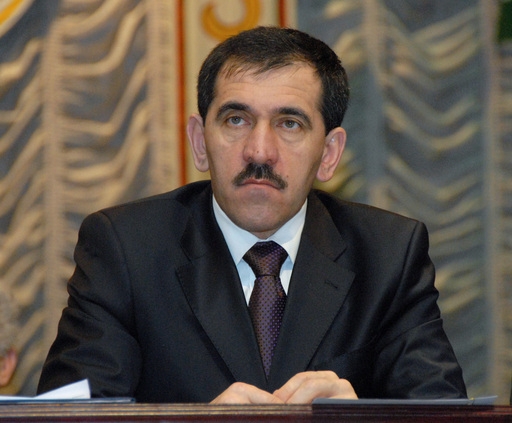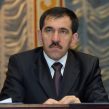
Kremlin Set to Replace Some North Caucasus Governors Before the Sochi Olympics
Publication: Eurasia Daily Monitor Volume: 10 Issue: 35
By:

On February 18, the popular Russian website RBC daily announced that the Kremlin is preparing the ground for removing the heads of several republics in the North Caucasus. The website asserted that after the president of Dagestan resigned from his position at the end of January, the next leader to follow would be the head of Ingushetia, Yunus-Bek Yevkurov. “The president of the country tasked the government to provide stability in the North Caucasus in the run up to the Olympics in Sochi, so changes in regional leadership are inevitable,” a Kremlin source told RBC daily. “There are no questions only about the head of Chechnya, Ramzan Kadyrov; the positions of practically all the other leaders of the North Caucasian republics are tenuous.” A senior source in the security services confirmed this information to the news outlet.
The Kremlin source elaborated on why Moscow has decided to sack the head of Ingushetia: “He [Yevkurov] appeared to be not tough enough as a leader and in the [North] Caucasus only such [tough leaders] can rule; therefore, a search is underway for his successor. So far no replacement has been identified, but there is an understanding that the republic needs someone like Kadyrov. The republic is mono-ethnic, so the candidate should necessarily be an Ingush.” The source alleged that Yevkurov’s tense relations with Ramzan Kadyrov also contributed to his political demise. Since gubernatorial elections in Ingushetia are due this September, the decision reportedly has been taken in Moscow not to allow Yevkurov to run for the office (https://www.rbcdaily.ru/politics/562949985756574).
Even though no official confirmation of Yevkurov’s resignation followed, chances are indeed high he will not run for the leadership position in Ingushetia in September and may be replaced even earlier. The Kremlin’s earlier move to replace the president of Dagestan indicated that Moscow is not excessively hesitant about changing governors in the North Caucasus even shortly before the Olympics. Human rights activists have criticized Yevkurov for allowing government forces to abuse their powers. Kadyrov accused Yevkurov of sympathizing with the rebels. Now, the Kremlin also appears to be dissatisfied with the degree of Yevkurov’s “toughness.”
According to the well-known opposition figure in Ingushetia, Magomed Khazbiev, some in the republic think Yevkurov was asked to leave after an Ingush opposition figure and former official of Ingushetia’s government, Sultan-Girey Khashagulgov, was killed in a police operation under suspicious circumstances on February 13. However, Khazbiev said that corruption was a much more likely motivation behind the Kremlin’s intention to replace Yevkurov. Commenting on Yevkurov’s legacy, human rights activist Magomed Mutsolgov stated: “Russian laws essentially do not work in the republic. No officer was held responsible for torture, for extralegal killings. There were many proven extralegal murders, including the murders of women and children. No one was held accountable for them.” At the same time some experts asserted that Moscow is not in a position to remove Yevkurov, because the security situation in the republic has significantly improved under his leadership (https://publicpost.ru/theme/id/3276/pochemu_uhodyat_evkurova).
While Yevkurov’s possible leave has been discussed in the Russian media for a while now, it is less certain who else could be removed by the Kremlin in the run up to the Olympics in Sochi in 2014. The head of Kabardino-Balkaria, Arsen Kanokov, is one of the most probable candidates to have evoked the Kremlin’s ire. Kanokov has been in power in the republic since 2005 and presided over the steady deterioration of the security situation in Kabardino-Balkaria. Kanokov may also be deemed by Moscow as not harsh enough on Circassian activists in the republic who are demanding the return of Syrian Circassians, a boycott of the Olympics in Sochi and are involved in a number of other issues that are extremely irritating to Russian authorities.
Yevkurov could be replaced by the previous head of Ingushetia, Murat Zyazikov (https://www.kommersant.ru/doc/2130299). The other possible candidates—Khazbiev and the first president of Ingushetia, Ruslan Aushev—are entirely unacceptable to Moscow, (https://publicpost.ru/theme/id/3276/pochemu_uhodyat_evkurova). The list of alternative candidates is even less clear in Kabardino-Balkaria. Ingushetia’s example shows that Moscow’s range of choices is limited to people who have already been tried out as republican leaders. With the “removal” and “appointment” of candidates in the North Caucasus republics openly being discussed in the Russian media, the existing law on electing governors across the Russian Federation is rendered a mockery that the government does not even bother to disguise. However, the longer Moscow postpones free and fair elections in the North Caucasus, the more the region slips into a process of Balkanization. Even the return of elections at this stage will probably only reinforce this process.
Ingushetia is one of the best examples of Moscow’s hands-on management logic and why it is failing across the North Caucasus to varying degrees. Moscow prefers having as heads of the regions easily manageable people who can be manipulated and coerced into any deal Moscow proposes. However, such leaders often are easily influenced not only by Moscow, but also by their own entourage, informal leaders and other local actors. Thus, Moscow essentially conflates governance of the regions with governance of governors. While Moscow may easily manage the governors who are politically weak, these particular governors invariably fail to manage their respective republics, precisely because they are so weak politically. Chechnya, of course, is a special case that is hardly replicable elsewhere in the region.




